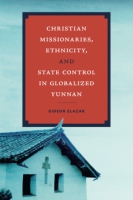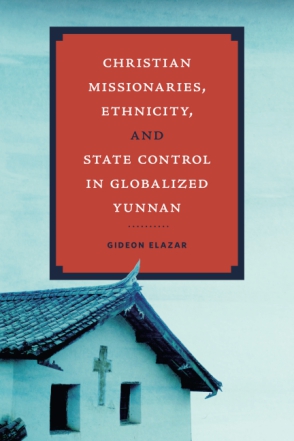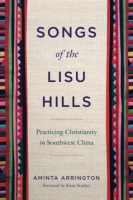Christian Missionaries, Ethnicity, and State Control in Globalized Yunnan
Gideon Elazar
“Provides valuable insights into Chinese Christianity and global evangelism. It enriches our understanding of diverse patterns of church-state relations in contemporary China and addresses issues of the Christ-culture conflict and Christian modernity in global and local contexts. Given the current Chinese government’s restrictive approach to religious affairs and the uncertain prospects of the post-COVID era, this research underscores the importance of continued scholarly efforts to understand the contemporary Chinese Christian experience.”
- Description
- Reviews
- Bio
- Table of Contents
- Sample Chapters
- Subjects
This book investigates the interaction of Western missionaries, ethnic minorities, and Han Chinese converts with the Chinese state in an increasingly globalized China. Based on extensive ethnographic fieldwork conducted in Yunnan, it tries to make sense of the disparity between official state rhetoric and everyday reality. Examining morality in the context of the free-market system, spatial practices, linguistic activity, and Christian welfare organizations, Gideon Elazar reveals the ways in which the previously conflicting Communist Party and Christian “civilizing projects” have reached a measure of convergence, enabling local authorities to treat missionaries with a degree of tolerance. Elazar shows how this unofficial arrangement relates to the social realities and challenges of the reform era, including ethnic culture and identity, Yunnan’s many social problems, and the integration of ethnic minorities into the state system.
By exploring the continuously shifting social and religious borders negotiated by converts, missionaries, and state authorities in Southwest China, this book sheds light on the larger issue of contemporary religion in China’s global era. It will be of interest to researchers of religion, Christianity, and minority groups in the People’s Republic of China.
“Provides valuable insights into Chinese Christianity and global evangelism. It enriches our understanding of diverse patterns of church-state relations in contemporary China and addresses issues of the Christ-culture conflict and Christian modernity in global and local contexts. Given the current Chinese government’s restrictive approach to religious affairs and the uncertain prospects of the post-COVID era, this research underscores the importance of continued scholarly efforts to understand the contemporary Chinese Christian experience.”
“Shows the complex relationship between missionaries, ethnic minorities, and Chinese state control, emphasizing not only confrontation and conflict, but also cooperation and compromise, and showing more possibilities for Chinese Christianity in the age of globalization.”
Gideon Elazar is Lecturer at Bar-Ilan University and Researcher in the Ariel University Eastern Research and Development Authority.
List of Illustrations
Map
Acknowledgments
Introduction: Conducting Fieldwork in Yunnan
Chapter 1. Christianity in Yunnan: Historical Background
Chapter 2. Ethnicity, Nominalism, and Global Salvation
Chapter 3. Perceptions of Christian Morality and the Free-Market Civilizing Project
Chapter 4. The Welfare Option: Yunnan’s Faith- Based Organizations
Chapter 5. Translating Culture: Missionary Linguists and the Construction of Authenticity
Chapter 6. Out of Space: Christian Deterritorialization and State Space
Chapter 7. Drawing the Borders of Ethno-Christianity: The Nationalities Village
Conclusion: The Future of State Tolerance of Religion in China
Notes
References
Index
Download a PDF sample chapter here: Introduction
Also of Interest
Mailing List
Subscribe to our mailing list and be notified about new titles, journals and catalogs.







